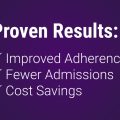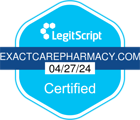
Benefits of Medication Management During Transitions of Care
There is a high propensity for medication errors and issues during transitions of care. In fact, an estimated 60% of all medication errors occur during transitions of care.¹ This is often due to the complexity of these transitions and different levels of communication required along the way.
Transitions of care involve moving the patient between or within healthcare settings as their needs change. Examples of these transitions include:
- Within Settings: Primary Care to Specialty Care
- Across Health States: Personal Residence to Assisted Living
- Between Settings: Hospital to Home Health Care
Care coordination and medication management are key components to successful transitions of care, as they can cause many challenges if not managed properly. In fact, inconsistent care coordination contributes to the readmission of 20% of patients within 30 days of discharge.²
Challenges During Transitions of Care
Both patients and healthcare professionals can experience a vast array of challenges while patients are being moved throughout care settings, and a hospital discharge can be an especially challenging time.
Patient Challenges
Even with the most well-managed discharge processes, patients can experience increased confusion when preparing to leave the hospital—if for no other reason than the amount of new information they are receiving. This can include:
- Information about a new diagnosis or changes to a treatment plan
- Follow-up instructions to see providers
- New prescription medications or medication changes
- Not fully understanding a new chronic condition
For patients who are already managing complex medication profiles, this process can be even more challenging. This can lead to poor medication adherence; adverse health events; and hospital readmissions.
Studies have even found that adverse drug events affect 11 to 17 percent of patients within the first two weeks after hospital discharge.³
Healthcare Challenges
One of the biggest challenges for healthcare professionals during and after transitions of care is ensuring the patient’s entire healthcare team has access to the most updated plan of care, including information about new prescriptions or medication changes. Communication can have a prominent role determining whether a transition for a patient is successful or not.
Inadequate communication can lead to¹:
- Medication errors
- Delays in care
- Overall confusion about the patient’s plan of care
- increased healthcare spending
Medication reconciliation and medication therapy management (MTM) have been proven to improve transitions of care.² These clinical pharmacy practices can help healthcare teams overcome the challenge of building an accurate and safe profile as a patient moves throughout their healthcare journey.
Medication reconciliation post discharge is an especially important pharmacy service for people who are taking multiple prescription medications and seeing multiple providers. Hospitalizations can be a stressful and scary time; it’s possible a patient may have forgotten to disclose some of their medications or inaccurately reported dosages or other prescription details, which can contribute to inappropriate prescribing. Medication reconciliation compares the discharge medication list with the patient’s existing medication list to help ensure all medications are appropriate and safe.
Partnering with a pharmacy provider who can provide this type of support as a patient transitions across multiple care settings—including providing coordination with the patient’s healthcare team—can yield positive benefits for payors, providers and patients.
Providing Medication Management Support to Patients at Discharge
Enabling patient success during a transition of care, like a hospital discharge, relies on many things. Medication management presents an often-overlooked opportunity for hospitals to expand the level of support they are providing to patients with chronic care needs—a group that often drives readmission rates—as they leave the hospital.
Comprehensive support from a pharmacy partner should take into consideration the unique needs of patients with chronic conditions to include:
- Medication reconciliation
- Regular medication reviews to potential medication and health risks
- Prescriber communication regarding clinical recommendations
- Coordination of updates to the patient’s medication profile
- Patient education and counseling to promote understanding of medications
High-touch pharmacy care models that include these types of services have been proven to have a notable impact on clinical outcomes, including improved medication adherence, fewer admissions and fewer inpatient days, and deliver exceptional patient satisfaction that can influence hospital CAHPS outcomes.
ExactCare works with all types of healthcare providers to help streamline medication management across transitions of care. For information about how to implement a medication management program into your discharge planning workflow, please contact us.







